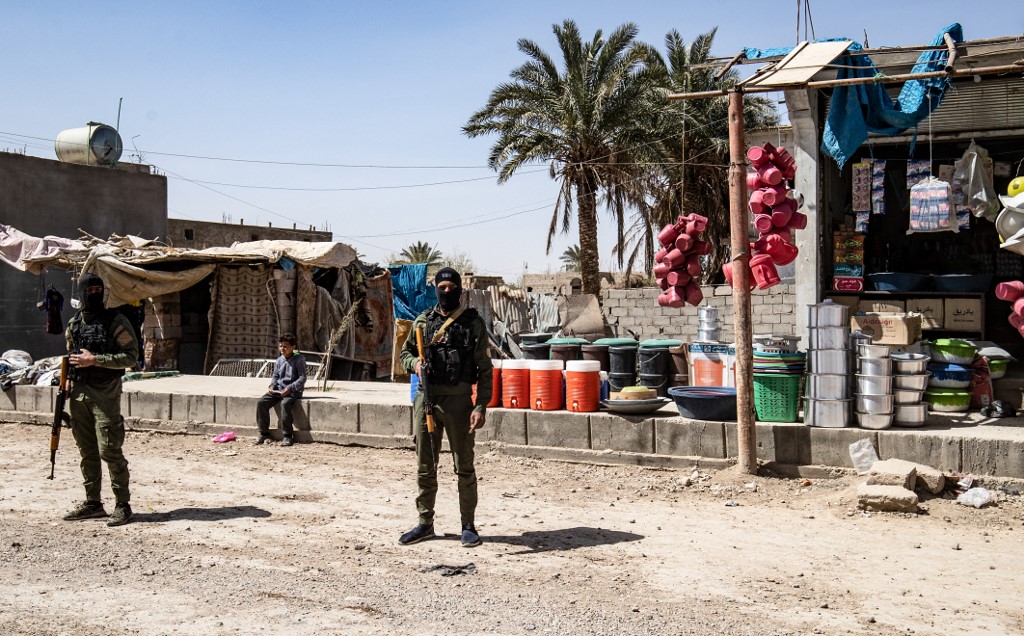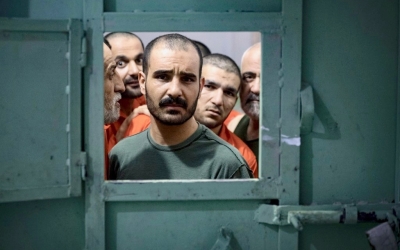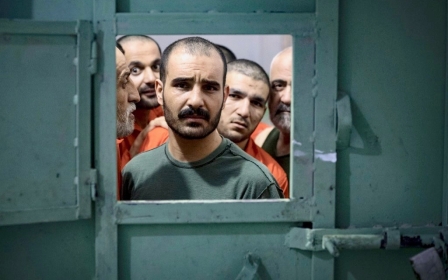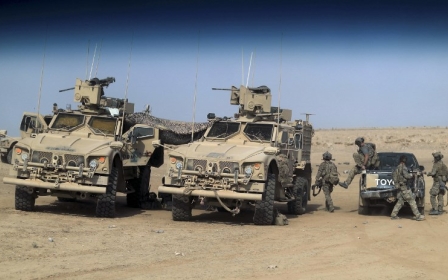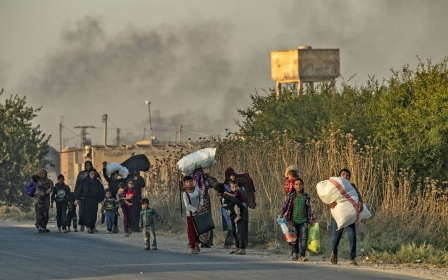Covid-19 in Syria: SDF's killing of civilian during curfew 'reminiscent of IS rule'
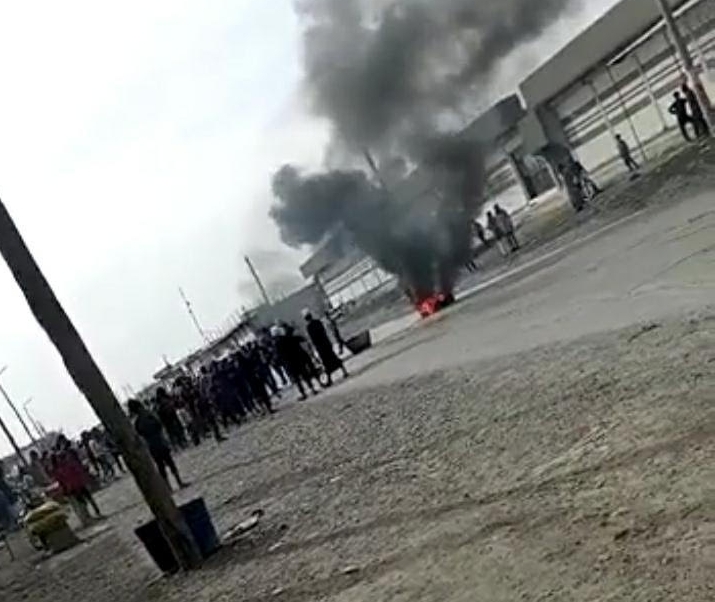
There have been clashes in Syria's Raqqa province after Syrian Democratic Forces (SDF) shot dead a shop owner on Friday while enforcing a Covid-19 curfew.
The incident in Jdeideh Keheit, a town in the eastern countryside of Raqqa, has prompted comparisons with the era of Islamic State (IS) rule that ended with the intervention of the US-backed SDF in 2017.
The SDF was founded in 2014 following IS's announcement of a "caliphate" in areas of Syria and Iraq that it had seized.
'Saleh was trying to justify to them that he needed to open his shop to gain money in order to feed his family in this bad economic situation'
- Eyewitness to the shooting of Saleh al-Ali
Kurdish groups, which have run autonomous Kurdish-majority areas since 2013, joined with local Arabs to form the group.
The alliance ousted IS from its de facto capital Raqqa in 2017, and then in 2019 seized the group's last Syrian holdout in the village of Baghouz near the Iraqi border.
New MEE newsletter: Jerusalem Dispatch
Sign up to get the latest insights and analysis on Israel-Palestine, alongside Turkey Unpacked and other MEE newsletters
Last week the SDF announced a 10-day curfew in northeastern Syria in response to a major increase in Covid-19 cases in the local community.
Saleh al-Ali, 27, was reportedly shot dead while pleading with SDF members that he needed to keep his shop open to feed his family.
Ibrahim al-Ahmad, a resident who says he was present at the shooting, told Middle East Eye that the shooting took place at five o'clock when an SDF military patrol stopped in front of the victim's shop in the town to force him to close it.
Then the SDF proceeded to arrest Saleh al-Ali for violating the curfew.
Hand-to-hand fighting
The issue developed into a hand-to-hand fight between SDF patrol members and the victim because he resisted the arrest order, Ahmad said.
"Saleh was trying to justify to them that he needed to open his shop to gain money in order to feed his family in this bad economic situation," he told MEE.
"After the fight started, one of the SDF fighters shot Saleh in his head, causing his death."
According to local sources, Saleh belonged to a large clan in Raqqa called Albaryaj. Members of the clan have been organising protests against the SDF in the aftermath of the shooting.
Saleh's family has been outraged by the incident.
"There are no words which can describe our anger and sadness when we received that news," Manaf al-Ali, one of Saleh's cousins, told MEE.
"There is no similar injustice to what happened, to see his family cry for their son who got killed for no reason."
Explaining how the family had reacted to Saleh's death, Ali said: "We decided with our relatives not to accept this injustice and not to let it pass as if nothing had happened.
"We met with our relatives from the neighbouring villages an hour after the incident and went out to the street to demonstrate against what happened, and we lit tyres to block the roads.
"But the SDF tried again to shoot us, which prompted us to respond in kind. We opened fire on them too, and the clashes started."
Ali said three other clan members were injured during the clashes, further angering locals and forcing the SDF to withdraw entirely from Jdeideh Keheit.
Townspeople then took control of the SDF's headquarters in the town and burned it down.
'Revenge against the population'
Abdulhamid, another of Saleh's cousins who preferred to talk anonymously due to his fear of being arrested by the SDF, told MEE that on Sunday the SDF raided the town in response to the disturbances.
“Two days after Saleh’s murder, the SDF raided our area using more than 50 military vehicles full of fighters and no one had the nerve to face them," he said.
"Among the people that the SDF arrested in that security campaign on Jdeideh Keheit is the victim’s father, in addition to 10 others of our relatives.”
'Two days after Saleh’s murder, the SDF raided our area using more than 50 military vehicles full of fighters and no one had the nerve to face them'
- victim's cousin
Abdulhamid said “most of the SDF actions when they stormed the town aimed to take revenge against the population's rejection of Saleh’s killing, and because people burned one of their headquarters in town."
So, SDF fighters burned the house of a civilian called Muhammad Alasaad in Jdeideh Keheit during the raid operation, he added.
In a statement to MEE, commander Abu Awas, the head of the Military Relations Committee of the SDF in Raqqa, denied any significant escalation between the SDF and clan members following Saleh's death.
"In fact, the issue that occurred is simpler than it sounds," he said.
"There is no dispute with the tribes in the area, and what happened has been resolved," he added, without elaborating.
Disputing Awas' account, Abdulhamid said what happened “was the opposite of what the commander from the SDF stated.”
Islamic State memories
Commenting on Saleh's death as a result of the SDF policing the curfew, Ahmed al-Sultan, a civil activist from northeastern Syria, compared the situation to that under IS.
IS captured Raqqa province during Syria's civil war and made Raqaa city its capital in 2014.
On 17 October 2017, after lengthy fighting, the SDF declared the liberation of Raqqa from IS to be complete.
"The de facto authorities always do this. They do not know how to behave with the people," Sultan told MEE.
"I compare what happened to Saleh by the SDF in Jdeideh Keheit with a similar thing that happened to me in 2015.
"During the period of Islamic State's control, there was also a curfew after eight o'clock at night, and IS fighters arrested me and took me to jail.
"Then the police chief in the prison, who was Algerian, grumbling to his colleagues when I objected to that unjust decision, said 'next time, shoot everyone who violated our orders. It is easier than arresting them'."
Tense situation
Ahmad said that the situation was still tense in Jdeideh Keheit, with locals fearful of further military operations by the SDF in which they could be hurt.
Northeastern Syria, which has a population of around five million people, has reported around 13,000 Covid-19 cases, including more than 400 deaths.
However, the real numbers are believed to be much higher with clinics set up to deal with the virus said to be full.
The World Health Organisation said last month that it would oversee a vaccination campaign in Syria, which is expected to start in April.
It said the aim is to vaccinate 20 percent of the population by the end of the year.
Middle East Eye delivers independent and unrivalled coverage and analysis of the Middle East, North Africa and beyond. To learn more about republishing this content and the associated fees, please fill out this form. More about MEE can be found here.


